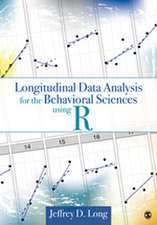Foundations of Multimethod Research: Synthesizing Styles
Autor John D. Brewer, Albert D. Hunteren Limba Engleză Paperback – 28 sep 2005
`This is a book I wish I had written. Although nearly every page contains an interesting methodological insight, it's the synthesizing nature of the multimethod perspective that I find most satisfying. Instead of a patchwork of precepts and procedures, Professors Brewer and Hunter present a coherent synthesis of the principal quantitative and qualitative research styles' - Kenneth O Doyle, University of Minnesota, Twin Cities
`This is a superb resource for anyone undertaking research in the social sciences. Going beyond simple descriptions of how to use each of the individual methods, Brewer and Hunter provide compelling arguments for systematically synthesizing different research styles at each stage of the research process. In doing so, they help us to see social science research as both an art and a science. By focusing our attention on how a multimethod approach can enhance each stage of the research, they avoid the simplistic dichotomy between qualitative and quantitative research and provide us with a much more sophisticated way of looking at the multimethod approach' - Sue R Faerman, University at Albany-SUNY
Preț: 552.65 lei
Preț vechi: 650.17 lei
-15% Nou
Puncte Express: 829
Preț estimativ în valută:
105.75€ • 110.71$ • 87.50£
105.75€ • 110.71$ • 87.50£
Carte tipărită la comandă
Livrare economică 05-19 aprilie
Preluare comenzi: 021 569.72.76
Specificații
ISBN-13: 9780761988618
ISBN-10: 0761988610
Pagini: 240
Dimensiuni: 152 x 229 x 13 mm
Greutate: 0.33 kg
Ediția:Second.
Editura: SAGE Publications
Colecția Sage Publications, Inc
Locul publicării:Thousand Oaks, United States
ISBN-10: 0761988610
Pagini: 240
Dimensiuni: 152 x 229 x 13 mm
Greutate: 0.33 kg
Ediția:Second.
Editura: SAGE Publications
Colecția Sage Publications, Inc
Locul publicării:Thousand Oaks, United States
Recenzii
This is a superb resource for anyone undertaking research in the social sciences. Going beyond simple descriptions of how to use each of the individual methods, Brewer and Hunter provide compelling arguments for systematically synthesizing different research styles at each stage of the research process. In doing so, they help us to see social science research as both an art and a science. By focusing our attention on how a multimethod approach can enhance each stage of the research, they avoid the simplistic dichotomy between qualitative and quantitative research and provide us with a much more sophisticated way of looking at the multimethod approach.
This is a book I wish I had written. Although nearly every page contains an interesting methodological insight, it’s the synthesizing nature of the multimethod perspective that I find most satisfying. Instead of a patchwork of precepts and procedures, Professors Brewer and Hunter present a coherent synthesis of the principal quantitative and qualitative research styles.
This is a book I wish I had written. Although nearly every page contains an interesting methodological insight, it’s the synthesizing nature of the multimethod perspective that I find most satisfying. Instead of a patchwork of precepts and procedures, Professors Brewer and Hunter present a coherent synthesis of the principal quantitative and qualitative research styles.
Cuprins
Preface
Historical Introduction
1. The Multimethod Approach and Its Promise
Four Imperfect But Useful Research Methods
A Broader Multimethod View
Finding Consensus in a House of Many Mansions
A Systematic Approach
2. A Healthy Skepticism About Theory and Method
Orienting Theory Toward Research and Vice Versa
A Healthy Skepticism
An Assessment of Four Research Styles
The Multimethod Approach: A Fifth Research Style
3. Formulating Research Problems
The Role of Research Problems in the Research Process
The Empirical Unfolding of Research Problems
The Role of Theory in Problem Formulation
4. Collecting Data With Multiple Methods
A Variety of Data-Collecting Methods
Validation Versus Exploration
Cost/Benefit Analyses of Different Methods of Data Collection
5. Finding the Objects to Study
The Dilemma of the Few and the Many
Units and Variables
Types of Sampling
Sampling and Generalization
6. Measuring Concepts and Assessing Measurement Validity
Defining Social Scientific Measurement
Judging Measurement’s Success From Facts Rather Than Fiction
Designing Validation Studies
What to Do if Measurement Fails (and How to Guard Against Failure)
7. Explaining Social Phenomena Causally
Causation and Causal Explanation
Modes of Causal Analysis
Assessing the Validity of Causal Research
Multitest Validity
8. A Postscript on Postmodernism
The Postmodern Critique
Some Research Examples
The Technology of Method
9. Making Research Public: The Social Context of Multimethod Research
Internal Politics
External Politics
Multimethod Research in Relation to Society
References
Index
About the Authors
Historical Introduction
1. The Multimethod Approach and Its Promise
Four Imperfect But Useful Research Methods
A Broader Multimethod View
Finding Consensus in a House of Many Mansions
A Systematic Approach
2. A Healthy Skepticism About Theory and Method
Orienting Theory Toward Research and Vice Versa
A Healthy Skepticism
An Assessment of Four Research Styles
The Multimethod Approach: A Fifth Research Style
3. Formulating Research Problems
The Role of Research Problems in the Research Process
The Empirical Unfolding of Research Problems
The Role of Theory in Problem Formulation
4. Collecting Data With Multiple Methods
A Variety of Data-Collecting Methods
Validation Versus Exploration
Cost/Benefit Analyses of Different Methods of Data Collection
5. Finding the Objects to Study
The Dilemma of the Few and the Many
Units and Variables
Types of Sampling
Sampling and Generalization
6. Measuring Concepts and Assessing Measurement Validity
Defining Social Scientific Measurement
Judging Measurement’s Success From Facts Rather Than Fiction
Designing Validation Studies
What to Do if Measurement Fails (and How to Guard Against Failure)
7. Explaining Social Phenomena Causally
Causation and Causal Explanation
Modes of Causal Analysis
Assessing the Validity of Causal Research
Multitest Validity
8. A Postscript on Postmodernism
The Postmodern Critique
Some Research Examples
The Technology of Method
9. Making Research Public: The Social Context of Multimethod Research
Internal Politics
External Politics
Multimethod Research in Relation to Society
References
Index
About the Authors
Notă biografică
John D. Brewer is President of the British Sociological Association and Sixth-Century Professor of Sociology and former Head of Department (2004-2007) at Aberdeen University, moving from Queen¿s University Belfast in July 2004. He was Head of the School of Sociology and Social Policy at Queen¿s between 1993-2002. He has held visiting appointments at Yale University (1989), St John¿s College Oxford (1992), Corpus Christi College Cambridge (2002) and the Research School of Social Sciences at the Australian National University (2003). He is a Fellow of the Royal Society of Arts (elected 1998), an Academician in the Academy of Social Sciences (elected 2003), a Member of the Royal Irish Academy (elected 2004), then only the third sociologist to be elected in the Academy¿s 217-year history, and a Fellow of the Royal Society of Edinburgh (elected 2008). He was a member of the Training and Development Board of the ESRC (2005-2007) and has been Chair of the British Sociological Association (2004-2006), a member of the National Committee for Economics and Social Science of the Royal Irish Academy (1997-1999) and a member of the International Assessment Panel of the Irish Research Council for the Humanities and Social Sciences (2002-07). He currently sits on the Council of the Irish Research Council for Humanities and Social Sciences and is a member of the ESRC¿s Research College. In 2001 he became a member of the Institute of Learning and Teaching in Higher Education. In 2010 he became a member of the United Nations Roster of Global Experts.
Descriere
Drawing from authors John Brewer and Albert Hunter's original work published in 1989, when single method research was the standard, this new text offers an explanation of how a planned synthesis of various research techniques such as fieldwork, surveys, experiments, and nonreactive studies can be purposely used to improve social science knowledge. Foundations of Multimethod Research: Synthesizing Styles explores the many aspects of the multimethod research approach, including the formulation of research problems, data collection, sampling and generalization, measurement, reliability and validity, hyposthesis testing and causal analysis, and writing and publicizing results.












